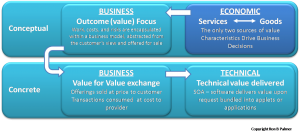IT service management is about delivering sustainable value to the business from the use of technology. It is not about defining the best process. It’s not about assigning process owners or service level managers. It is not about implementing a tool or resolving incidents or problems. It’s not even about managing change. It is about delivering value to the business from services. If you want to build an IT service business you better clearly understand the four aspects of IT services.
Those four aspects are identified in this graphic and the first definition to understand is the

conceptual economic definition.
- Four Aspects of Service Definition
There are two and only two ways to deliver economic value. You can produce goods or you can produce services. There is no other way. The business decisions needed to produce goods are very different from the business decisions needed to produce services. One of the fastest ways to go out of business is to organize your business around producing goods when you are in a service market.
IT service management draws a line in the sand stating that Enterprise IT exists to deliver services. Many IT departments have a difficult time understanding this when they deliver physical products such as servers and laptops. The point they miss is that an Enterprise laptop is about as useful as a brick without the services provided via the laptop such as network connectivity, business applications, communications connectivity, etc. The value is not in the individual having a laptop, it is in the outcomes that the individual produces for the business using the laptop.
Goods and services are opposite ends of the value spectrum and most businesses actually deliver a combination of the two. You can think of goods and services as existing on opposite ends of a continuum. New car dealers clearly sell goods in the form of cars. However, they wouldn’t be able to sell many cars if they didn’t include a service warranty with the purchase. Likewise restaurants clearly provide a service in preparing, serving, and cleaning up after your meal. The meal is a good, but you wouldn’t go to a restaurant without the service, you would go to the grocery store instead.
There are significant differences between goods and services and understanding these differences is critical to your success in ITSM. These differences are clearly defined in every Economics 101 text book and if you want to be successful in ITSM you should clearly understand these differences. An good discussion of Economic Goods and Services can be found in Wikipedia and I recommend this as a key place to start.
The first step in building an IT service business is to understand services as economic concepts with unique characteristics that distinguish them from economic goods. These distinctions dictate the rules of successful production and sales. If you attempt to produce services the same way you would produce goods, you will provide inadequate services. If you try to sell services the same way you might sell goods, you are likely to go hungry.
An excellent discussion of how successfully selling services differs from selling goods can be found in a Harvard Business Review Article by Warren J. Wittreich titled, How to Buy/Sell Professional Services.
From there the advanced definition provided in the ITIL Service Strategy book will make a lot more sense and become a lot more useful as the third aspect of services. Their new definition and introduction of the terms utility and warranty are very useful to an advanced conceptual understanding of economic services. These two aspects combined provide the conceptual underpinning for services as the building blocks of a value producing IT Service Management organization. There are two types of building blocks that you will use in building your service management organization, business transactions and technology transactions.